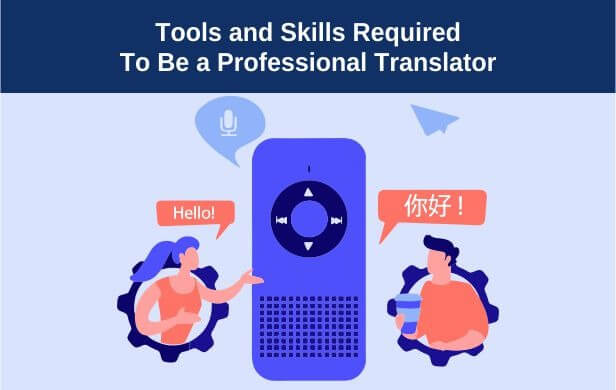
Are you interested in becoming a Professional Translator? Wondering where to begin? Here is a list of skills and tools you need to master in order to be a Professional Translator.
Knowing a language or being bi-lingual is just one part of becoming a professional translator. There are additional responsibilities and tasks that will challenge you. Let us first look at the skills required to be a translator -
Note that language knowledge is not mentioned as it is a prerequisite. Knowledge of any Indian or Foreign language, and a genuine passion for it is the reason you would want to go ahead in this career, hence the skills mentioned here are an extension of your practical preparation for this field.
Cultural knowledge and language have a strong and intertwined relationship. Translators have to understand and translate different backgrounds, cultural references, idioms and the underlying context. Thorough cultural knowledge and understanding can help a translator communicate efficiently.
Written, as well as verbal communication skills, are very important for a translator. They should be able to translate documents without losing any contextual meaning or communication within them.
Writing skills include the following components:
Strong research abilities are an absolute must for translators to discover and validate the rules of many languages. As translators obtain a greater understanding of languages, research skills can aid in their ongoing learning.
Translators can enhance and speed up their translations by using a variety of CAT tools. The following are a few CAT programs that a translator might use:
Consult specialized translation services like Language Services Bureau looking for the best professional translation tools.
Translators need to produce fully accurate, well-worded translations regularly.
Balancing time and record-keeping is essential to be a good translator. Deadlines are sacred and need to be respected and therefore time management skills are very crucial.
The energy and discipline to do what you have to do, and go the extra mile when you need to, can only come from you.
Clients must be able to rely on you to respond promptly to communications and meet translation deadlines.
The quality to take non-standard translation projects and unusual client requests in your stride and to consider reviewer critiques and suggestions with an open mind will get you great reviews and repeat projects.
This is real basics in any profession, but something that is often ignored or unknown - to maintain confidentiality, observe business and professional ethics, respect your client/supplier relationships.
Translators who are naturally curious find all texts interesting, so enjoy every translation project. And people who enjoy their work tend to do a better job.
Translation studies is an interdisciplinary subject dealing with the systematic study of the theory and application of translation and localization. Translation Studies borrows much from the various fields of study that support translation.
If you are looking to become a professional translator or just need to upskill your knowledge, check out the Orientation in Translation Course by Language Services Bureau. conducted by the best Translators and Trainers. The course helps you get sensitized to translation work, start improving on your language skills and begin to translate. Guest lecturers with linguistic and translation backgrounds provide their outlook in the real world to the students. The scope of Localization is also discussed during the training. The lectures that are conducted are dynamic in nature where every student gets to be part of the discussion and put forth his/her point of view. This course gives a real time experience to students on how the translation industry works. We also offer a one-week internship at the end of the course to deserving students.
Register now!
For any queries related to language translation services. Inquire at our email address below or give us a call today!
info@languageservicesbureau.com
Telephone: +91-20-24470509, +91-82370 60559
Similar articles for you...

आमच्या गेल्या महिन्यातील ब्लॉग मध्ये भाषांचे ज्ञान आवश्यक असणाऱ्या करियर क्षेत्रांची माहिती आपल्याला मिळाली. जिथे भाषेचे ज्ञान फायद्याचे ठरते असे इतर व्यवसाय आपण या महिन्यात पाहुयात.

Posted by : Language Services Bureau

The time it takes to learn a language depends on what you want to do with it– here is a great article about language learning and the kind of expectations you can set about the time required for the same!